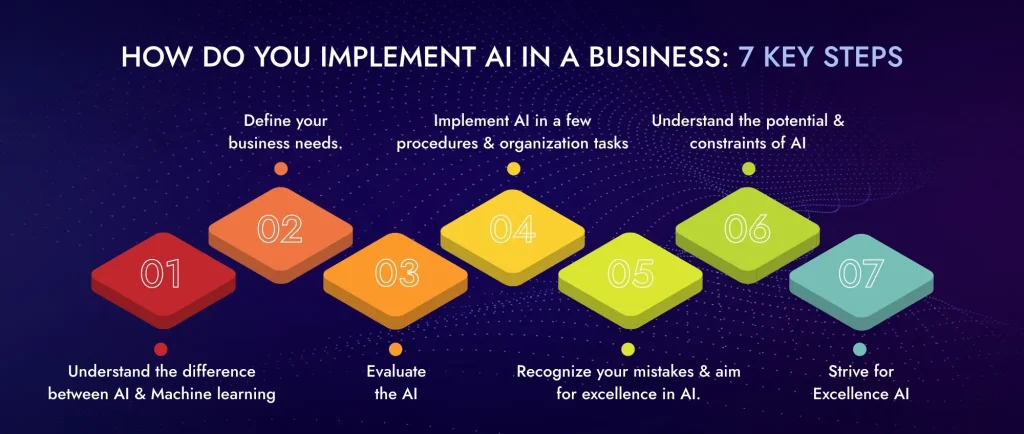In the last few years, AI has become a synonym for the future and revolution. But here at ViitorCloud, we think AI is not the future but the present. It’s because several businesses are already embracing the latest AI techs in their operations. For instance, AI-powered chatbots have significantly improved customer service, machine learning algorithms have enhanced productivity, and data analytics tools have increased efficiency. So, the right time to invest in AI is today!
After the advent of chatbots like ChatGPT, the market is flooded with lots of new AI technologies, but AI is not just limited to chatbots. As stated, there are lots of new AI technologies that businesses, regardless of their type, can use according to their preferences and goals, making AI a versatile and adaptable tool.
ViitorCloud helps businesses implement a wide range of the latest AI solutions, including chatbots, machine learning, and data analytics so that they thrive in the competitive, dynamic market. Here, we have explained how you can implement AI in your business in seven steps and how ViitorCloud can help you at each step.
How Implementing AI in Your Business Is Beneficial
Before we go into the key steps of implementing AI in your business, it is important to know how advantageous it is. AI for businesses is about more than automating tasks; it is about data analysis. It is about making operations easy and making you stand out from competitors. Let’s learn how to incorporate AI into your business to uncover the company’s true potential.
Improves Efficiency
AI solves multiple business problems, such as automating repetitive tasks, data entry, and customer service. As a result, your employees can focus on essential functions of innovation, strategies, and creation.
For instance, chatbots answer customers’ queries 24/7, and customer support focuses on critical tasks. It increases productivity and reduces business costs.
Data-driven decision
AI can analyze data of customers, markets, and operations and translate it into actionable insights. Predictive analytics helps you anticipate trends, optimize resource allocation, and make profitable decisions.
Growth beyond borders
When you provide personalized product recommendations to customers, you expand your reach. Also, as per individual preference, marketing campaigns expand your market reach and allow you to work for new market segments.
Customer experience
AI analyzes the preferences and behaviors of the customer and provides recommendations to customers that satisfy them. For instance, virtual assistants solve queries and recommend products or services as needed. It is not just a business providing you service but building relationships and loyalty.
Innovation
AI analyzes the data to identify new product ideas, predict the failure of the product or services, and streamline R&D processes. The analysis of failure helps businesses in improving their business product or service. Also, it helps in innovating your businesses to stay ahead of the competition.
How do you implement AI in a business: 7 key steps
It is an unsaid fact that AI is changing businesses across industries. It could contribute up to USD 15.7 trillion to the global economy in 2023, says a PWC report. So, it is essential for you to embrace it before it is too late. So, here’s how to adopt this latest technology in your business.

1. Understand the difference between AI and Machine learning
Firstly, when implementing AI in a business, you must understand what AI and machine learning are.
Artificial intelligence – AI is a machine that thinks like humans and imitates human behavior. It can process large amounts of data like human beings. AI can analyze, recognize patterns, and make decisions just like humans.
Machine learning – ML refers to the branch of artificial intelligence that focuses on data and algorithms to make decisions as humans and provide accuracy in the decision.
So, in this step, we help you understand what you really need i.e., AI or ML.
2. Define your needs
Defining business needs is the second step of the AI implementation strategy. Businesses must define the problems they want AI to solve to know their business needs. For that, we ask you these five questions such as follows:
- What outcome do you want to see?
- What are the obstacles to achieving your goals?
- How do you measure success?
- How can AI help you succeed?
- What data do you have today and need in the future?
The answers to these questions help you to understand your business needs. Once business needs are known, you can search for a solution.
3. Evaluate the AI
Implementing AI in business analysis of the company’s readiness is important. Also, evaluate current infrastructure, data accessibility, and personnel capabilities. In addition, you must check how easily businesses can adopt new ideas and developments.
This seems daunting task, right? Don’t worry, we will help you evaluate the current tech and find the right AI solutions for you.
4. Implement AI in a few procedures and organization tasks
Businesses can begin integrating AI into selected processes and jobs. This allows the company to experiment, gain insights, and demonstrate the value of AI to stakeholders. Additionally, it helps understand the challenges involved in AI.
With this, we can address the challenges before they become bigger issues in the future.
5. Recognize your mistakes and aim for excellence in AI
When new technology is implemented in business, mistakes can’t be avoided. In business, you must consider it a lesson rather than getting demotivated. You need to continuously use new tactics to check which is working to achieve your aim for excellence.
6. Understand the potential and constraints of AI
It is essential to keep realistic expectations with AI, what it can do or not. AI can’t solve all business issues. You need to understand its potential and constraints as businesses you can use correctly.
7. Strive for Excellence AI
The last step is an AI implementation strategy, which strives for excellence in AI. In business, striving is achieved by learning, developing, and adapting AI. Also, in your business work environment, encourage staff to test fresh AI technology and strategies.
Thus, this is how artificial intelligence implantation takes place in business. ViitorCloud helps you in the whole process and makes your journey even smoother while you focus on your goals and progress.
Don’t just implement AI—master it with ViitorCloud. Our customized AI solutions are crafted to enhance your business efficiency and growth. Get in touch with us today to create a tailored AI implementation strategy.
Future trends in AI for businesses
Several trends promise to transform how businesses operate, make strategic decisions, and interact with customers. Let’s understand how future trends in AI are transforming business.
Generative AI
Implementing AI in business with generative AI helps automate aspects of web development, from front-end design to back-end functionality. Also, AI is integrated into content management systems to streamline workflows, improve security, and optimize site appearance and functionality. AI helps automate code generation, layout optimization, bug detection, and improving efficiency. It creates website templates and themes. AI helps in content management systems for text and image generation, language translation, and SEO optimization, saving time and improving user experience.
Cybersecurity solutions
AI provides cybersecurity solutions by analyzing large amounts of data to identify anomalies and security threats. Also, the system uses machine learning to detect unusual behavior and patterns that indicate cyberattacks, such as malware infections. Cybersecurity issues are arising in emails and devices that can be protected with AI technology. AI uses machine learning to detect spam, phishing attempts, and malicious attachments by analyzing email headers, content, and sender behavior. Popular email service providers like Yahoo and Gmail use artificial intelligence to protect users from spam or hackers. It is the way artificial intelligence implementation takes place in cybersecurity.
Automation
Automation helps in business transformation by automating repetitive and time-consuming tasks so that businesses can focus on more critical tasks. Also, the use of AI reduces human error and improves productivity and efficiency. There are three types of automation Robotic Process Automation, cognitive, and predictive analytics automation. Robotic Process Automation automates repetitive tasks such as form filling, data entry, and extraction. Cognitive Automation helps systems understand, interpret, and make decisions based on data. Predictive Analytics Automation combines AI and machine learning to analyze history patterns and data for business prediction. This automation creates a customer base, improves profit, and optimizes operations.
Quantum AI
Quantum AI is a combination of quantum computing and artificial intelligence. It is helpful in image and speech recognition with accuracy and speed process. Quantum AI is useful in other areas of finance. Analyzing large volumes of financial data quickly and accurately helps manage effective risk and provides better investment decisions.
Conversational AI
Conversational AI is a technology that recognizes and responds to text and speech inputs. This is possible through the combination of natural language processing and machine learning. The one common application of conversational AI is chatbots, which interpret user inputs and carry on a conversation with national language processing. Other applications are virtual assistants, voice assistants, and customer service chatbots. It is the way conversational AI is useful in business.
So, these represent the future of AI development, and this is how Artificial Intelligence is modernizing your business.
Harness the power of AI technologies to supercharge your business processes. Partner with ViitorCloud for cutting-edge AI services that drive real results.
How ViitorCloud helps to implement AI in your business processes
Implementing AI in business processes is no longer a future approach, it is a present-day concept that allows organizations to stay competitive. Also, using AI with a defined objective and strategy will take the business to the next level. The business will run smoothly and efficiently with the right AI technology and good-quality data.
ViitorCloud, an AI consultancy service company, has a professional AI team that integrates AI into business processes, enhances efficiency, and helps with decision-making. We understand clients’ unique needs and then design and implement AI solutions according to client requirements.
To help you get started, Viitorcloud helps in implementing AI in business; you gain a trusted partner that empowers your business to stay ahead of competitors in the competitive digital world.
Frequently asked questions
Artificial intelligence implementation for businesses involves identifying business needs, choosing the right AI technology, data preparation, Developing AI models, integrating AI into the system, and monitoring and maintaining things.
AI implementation is essential for business as it improves productivity, personalized experience, data-driven decisions, and enhanced security, stability, and accuracy.
The applications practical in AI are hiring and recruitment, cybersecurity, market prediction, customer analysis, billing and invoice, and virtual assistant.
AI enhances business intelligence by automating tasks, analyzing data, identifying trends, and helping decision-making.

Vishal Patel
Vishal Patel is an experienced Solution Consultant with a proven track record in the information technology and services industry.
